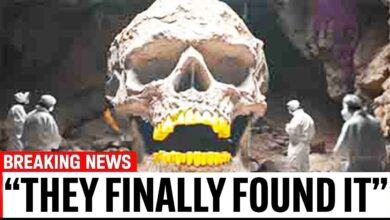“It Presented Too Much Risk!” Explorer Reacts To Deaths Of Titan Sub Passengers
"It Presented Too Much Risk!" Explorer Reacts To Deaths Of Titan Sub Passengers

Well, Josh Gates, the host of Expedition Unknown, joins me now. Uh, Josh, thank you very much indeed for joining me. You actually walked away from an opportunity to film the Titanic down, uh, where it lurks in the ocean. Why was that?
Well, we were thinking about doing a special on Titanic and to work alongside Stockton and OceanGate. We went up to the OceanGate headquarters in Everett, Washington, in 2021, so this was just a few months before OceanGate was set to take its first group of passengers down to the Titanic. We spent a few days up there and we went out on Titan in Puget Sound and took it out for what was effectively a shakedown dive, getting it ready for those operations in the North Atlantic. And, you know, by the end of my time there, I had a real, you know, a terrific time working with Stockton. I’m absolutely kind of just beside myself here listening to all this, just kind of taking it in in real time. It’s just, um, it’s a lot to process. But by the end of that experience, I just did not feel that this was for me. I really felt more than anything that it was nearly impossible to measure the risk of Titan as a platform. It was just almost impossible to measure it against anything else. It is such a unique vehicle; it is a one-off. You know, there’s nothing else like it, and because of that, there’s nothing to compare it to. And for me, it represented, uh, frankly just too much risk, and it just wasn’t for me in the end.
Do you feel that, but for the grace of God, about this?
Yeah, I mean, it’s… yeah, you know, um, I knew Stockton and again, I really am just stunned sitting here about this news. I knew Hamish Harding as well, who’s a fellow member of the Explorers Club, an incredible individual, um, a big figure both inside and outside the club. And, um, yeah, I mean, I’m beside myself. There’s something… I just sit here listening to this news and remember my time in Titan, remember going down. I spent probably two or three hours in the sub with Stockton, taking it through its paces. And, you know, I think like everybody, I just prayed right up until that conference for a miracle, for a positive outcome to all this.
Titanic film director James Cameron, currently speaking to ABC News in America, has just said, “I’m struck by the similarity of the Titanic disaster itself, where the captain was repeatedly warned about ice ahead of his ship and yet he steamed at full speed into an ice field.”
Yeah, I mean… listen, this is a really difficult moment, I think, for the families of these individuals. I don’t share some of the viewpoints of your… of, um, of the gentleman Fred who was on a few moments ago. What I do share is this really strong belief that the passengers aboard Titan were incredibly courageous individuals. You know, I’ve really been sickened by so much of the, especially on social media, so many people commenting, “Why would you do this? Why would you put your life at risk to go down there?” And I have to say that, you know, um, look, Titanic has fascinated the world since the night that she sank and it holds a deep personal meaning for many people. Shipwrecks in general, as someone who’s visited many shipwrecks in my career, shipwrecks are time capsules. They connect us to the past in a really intimate way, and there are people—uh, I mean, look at P.H. Nargely. His entire career had been devoted, uh, after his work in the Navy, to studying Titanic and to being one of the world’s foremost experts on this ship. This is something that held great meaning for these people. And so, uh, you know, as someone who went in Titan and really didn’t feel like I was comfortable going down to those depths in it, I have to say it takes an enormous amount of determination, of courage, of fortitude to take any trip inside a submersible—Titan or otherwise. And so, I think there should be a huge amount of admiration for all those people.
Yeah, that’s for Stockton. I have to say, you know, I really, really admire his vision. I admire his spirit of innovation. I admire that he was a risk-taker. In some ways, I do think there are still really important questions to ask—not today, but soon—about his calculations of risk and acceptable risk. And again, I don’t think that’s something for today, but I do think that he was an innovator. He was someone who was trying to create a new platform that could open up the depths of the ocean to more people. I think that is a commendable, noble aim. I think there are big questions about how he got there, and I think that there’ll be a time for that. But as for today, I just remain so heartbroken for the families of these people and for the passengers—all of them—um, because I do think, as an explorer, as a guy who understands people’s passions for things like this, um, it was an admirable goal to go down there.
And Hamish Harding—an extraordinary guy. He’s a British billionaire, 58 years old, he’s chairman of a Dubai-based private plane firm, Action Aviation, but he holds three Guinness World Records, including the longest duration of full ocean depth by crewed vessel when he, in March 2021, and Ocean Explorer Victor Vescovo dived to the lowest part of the Mariana Trench. He was also mission director and crew pilot for the flight mission One More Orbit, which set the current world speed record for the fastest circumnavigation of Earth by aircraft over both geographic poles. I mean, they’re quite extraordinary adventurer and explorer, and, you know, are there many people who are billionaires who would risk everything to go down to the bottom of the ocean to see the wreck of the Titanic? I doubt it. And there are some—Richard Branson is one that springs to mind, who has done that kind of thing. But there are many, most of them bank their cash and sit somewhere, you know, surrounded by comfort and security. This guy risked his life, and yes, he lost his life doing it, but he was, in his bones, an explorer, an adventurer, a risk-taker. Probably made him the success he was, and I think that that’s why I totally concur with you that when people ask, “Why did they do this?” Well, why does anyone do anything out of the ordinary? Why does anyone go, you know… there are people who climb K2, right? I’m not going to climb K2, that’s not for me, but I wouldn’t say that someone was crazy to do it. Because whether it’s mountaineering, whether it’s deep-sea exploration, whether it’s, you know, anything, if it holds great personal meaning to you, then it’s something that’s admirable for you to do, you know? And so, I think these people were incredibly brave.
Josh, I really appreciate you joining me. Thank you very much indeed.
Thank you, Pierce.








